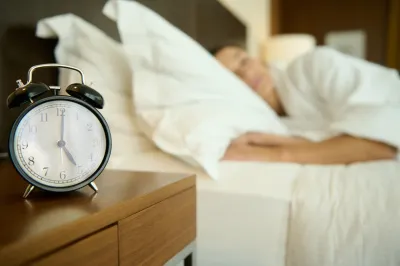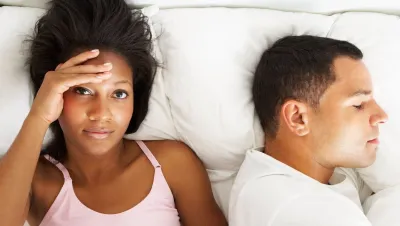The Connections Between Intimacy and Sleeping
Ana Marie Schick: Resident Sleep Expert and Certified Health Coach • Feb 07, 2024

Key Takeaways
Sex can support better sleep by calming the nervous system, but it works best alongside solid sleep habits.
- Orgasm releases hormones like oxytocin and prolactin that promote relaxation and make it easier to fall asleep.
- Intimacy lowers cortisol while increasing dopamine and endorphins, helping your body shift into a calmer, sleep-ready state.
- Post-sex sleepiness can differ by person. Men often feel drowsier, while women’s responses may vary based on timing and context.
- Nighttime intimacy may help with falling asleep, while morning intimacy can feel more energizing depending on your natural rhythm.
- Sex can support sleep, but it doesn’t replace the basics—consistent bedtimes, a cool room, and a screen-free wind-down still matter.
Sexual health is an important aspect of overall health that encompasses physical and emotional state and social well-being.
Sleep is a critical component of well-being, impacting nearly every bodily process and system.
Although both sleep and sex play a significant role in overall well-being, the connection between them has often been ignored. Luckily, advancements in health sciences have uncovered a critical, two-way relationship between sex and sleep.
The evidence so far demonstrates that better quality sleep can positively impact sexual health. Getting enough restful sleep can increase energy levels, improve overall mood, and reduce stress, leading to a more satisfying sex life.
Similarly, engaging in sexual activity can trigger the release of hormones such as endorphins and oxytocin, which can encourage relaxation and help you fall asleep faster.
Sex Research Study: Research suggested that 71% of participants reported an improvement in their sleep quality, and 62% said they fell asleep faster after having sex with a partner. [1]
So, there appears to be a mutually beneficial relationship between sleep and sex, each contributing to the other's well-being. However, more research is needed to fully understand the complex interplay between these two important aspects of our lives.
Recognizing the associations between sleep and sex can enhance both adult health contributors.
How Does Sleep Affect Sex?
Getting enough sleep is vital for maintaining overall mental health and enhancing aspects of sexual function and satisfaction. The quality and quantity of sleep you get can influence your hormonal balance, which plays a critical role in sexual desire and function.
Sleep Study: Improving Sleep Quality Leads to Better Mental Health [2]
When you don't get enough sleep, decreased sexual responsiveness and even sexual dysfunction due to hormonal imbalances and increased stress levels.
Did You Know: Sleep and short-term sleep deprivation have been linked to a decrease in both sexual desire and arousal among women. [3] Therefore, experiencing insomnia, which is a prevalent sleep disorder, could potentially be a contributing factor to higher risk of sexual dysfunction and poor sleep quality.
On the other hand, quality sleep can boost sexual desire and improve overall sexual health. During sleep, the body repairs and rejuvenates itself, including the reproductive system. Moreover, sleep helps to regulate the hormones responsible for sexual function, such as testosterone, estrogen, and progesterone.
Sleep Study: Getting an extra hour of sleep at night can increase the likelihood of engaging in sexual activity with a partner the next day by 14%. [4]
Therefore, understanding the importance of sleep in sustaining a healthy sex life is crucial for overall well-being. By establishing good sleep patterns, reducing stress, and prioritizing sleep hygiene, you can improve your sexual health, improve sleep, and enjoy a more satisfying sex life.
Sleep Systems for Couples
Don't let sleep interfere with your intimacy! Our cooling and heating mattress topper can help improve your sleep quality. We offer two options: "ME" (1-person) or "WE" (2-person). Why pay for an entire bed when you only need half of the bed?

Does Sex Help With Sleep?
Research indicates that orgasms, achieved either through sex with a partner, can aid in falling asleep. This is due to the release of hormones like oxytocin and prolactin, which induce feelings of relaxation and happiness, coupled with a decrease in cortisol, a hormone associated with alertness.
Does sex make you tired? Well, the hormonal shift generally leads to sleepiness. However, a minority of individuals report difficulty sleeping and reduced sleep quality following sexual activity.
One study of women between 50 and 79 found that shorter sleep duration translated to lower sexual satisfaction. [5] Many things can take a toll on a woman's sex drive in menopause, and this research suggests that poor sleep is one of them.
However, the sleep-sex link can be found in younger women, too. Another study of college-age women found that women who slept for longer periods at night were more likely to have sex the next day. [6] Women who regularly got more sleep also reported greater sexual desire and better sexual arousal during sex.
Sleep and Sex Study: The Influence of Sexual Activity on Sleep Quality [7]
After: Why Men and Women React Differently
We'll explore the reasons behind the vdifferent reactions men and women experience after sexual activity.
Men and Sexual Activity
Let's also consider the well-known cliché: many guys like to skip the cuddling and go straight to sleep after sex. However, there's actually a biological reason for it. Besides all the hormones coursing through their bodies, men also get a surge of a hormone called prolactin after they ejaculate.
Prolactin is linked to sexual satisfaction, and it's also associated with the “refractory period” guys experience after orgasm, which is why they are usually most interested in relaxing directly after sex. Prolactin levels are naturally higher during sleep, so it's likely that the surge men get after orgasm causes them to feel sleepy after sex.
Women and Sexual Activity
Women also experience a prolactin surge after climax—but that's not all. A study of healthy premenopausal women found that sexual stimulation boosted estrogen levels, while another linked higher estrogen levels with enhanced sleep amount and continuity. [8]
Another study of women's brains during sex found that during sexual stimulation, activity fell in the amygdala and the hippocampus, the areas responsible for alertness and anxiety. [9]
In other words, good sex shuts down the parts of your brain that make you feel stressed and anxious—and less stress and anxiety often translate to better sleep.
Sleep Disorders and Sex
It's important to note that common sleep disorders like obstructive sleep apnea can also take a toll on sex. Recent research on men with sleep apnea has found that many also experience erectile dysfunction (ED). [10]
It's not completely understood why the two are connected, but research suggests that sleep deprivation plays a role. Men's bodies produce testosterone at night.
The good news is that men who get treatment for sleep apnea often notice an improvement in the amount of sleep they get and their sex lives.

How to Improve Sexual Health and Sleep
There are some suggestions on how improving your sleep can affect your sex life, and improving it can lead to improving the quality of your sleep.
Sleep Environment
Set the temperature to suit your preference to make your bedroom more inviting and conducive to a good night's sleep. This can be achieved by adjusting your air conditioning or heating system accordingly.
Read: Why Do I Get So Hot When I Sleep
Additionally, you can use dim and warm lighting to create a relaxing ambiance in the room. You can use pleasant and soothing scents, such as lavender or vanilla, to enhance the atmosphere further.
Lastly, it's important to have a supportive mattress that is optimal for your sleeping habits, as this can greatly affect the quality of your sleep. By paying attention to these details, you can create a comfortable, restful, and inviting bedroom that promotes better sexual activity and improved sleep afterward.
Create a Dark Bedroom
Let's start with the obvious: simply being in bed with the lights off can help you sleep better! It's a cue to your brain that it's time to sleep (this goes back to those sleep habits we mentioned).
So, when you add that sex requires physical exertion, it makes sense that you'd feel tired afterward.
Maintain a Healthy Sleep Schedule
It's been shown in sleep science that keeping a sleep schedule can improve the overall quality of sleep. This means falling asleep and waking up simultaneously each day, including vacation time and weekends. A sleep schedule is essential.
Items to Reduce or Avoid
Certain substances can have a negative impact on your sleep quality, such as tobacco, caffeine, and alcohol. These substances interfere with the natural sleep cycle and can prevent you from getting a good night's rest.
Caffeine, for example, is a stimulant that can keep you awake and alert for several hours after consumption. Tobacco, on the other hand, contains nicotine, which is also a stimulant and can disrupt your sleep pattern.
Does alcohol help you sleep? While it may initially make you feel drowsy, can lead to poor quality sleep and frequent awakenings throughout the night. To optimize your sleep quality, they can disrupt sleep, so avoiding these substances before bedtime is recommended.
Technology Free Bedroom
One helpful way to promote better sleep hygiene is establishing your bedroom as a technology-free zone before bedtime. This involves putting away all your electronic devices, such as cell phones, laptops, and tablets, for at least 30 minutes before you plan to go to sleep.
Doing so can create a calmer and more peaceful environment that is conducive to sleep. The blue light emitted by electronic devices can interfere with your body's natural production of melatonin, making it harder to fall asleep and stay asleep.
By disconnecting from technology and engaging in more relaxing activities, such as reading a book or taking a warm bath, you can help your body wind down and prepare for a restful night's sleep.
Relaxing Techniques
One effective way to improve sleep quality is to learn relaxation techniques and incorporate them into the nightly routine. This can involve practicing deep breathing exercises, gentle stretches, or engaging in mindfulness exercises.
By winding down with calming activities before bed, the body and mind can better enter a state of relaxation, making it easier to fall asleep and stay asleep throughout the night. Over time, incorporating relaxation techniques into the nightly routine can become a habit, leading to more restful and rejuvenating sleep.
Taking steps to improve your sleep hygiene is crucial for getting the sleep you need every night. This means adopting healthy habits such as establishing a consistent sleep schedule, creating a relaxing bedtime routine, and avoiding stimulating activities before bed.
By prioritizing good sleep hygiene, you'll not only feel more alert and focused during the day, but you'll also be setting the stage for a more fulfilling sex life. This is because adequate sleep can improve sexual performance, and enhance overall satisfaction.
So, whether you're dealing with sleep deprivation or simply looking to enhance your sex life, making an effort to improve your sleep hygiene is a smart and worthwhile strategy.
Good Sleep, Better Sexual Health, Happier Humans
Obviously, this post outlines that you can approach this from two different fronts: work to naturally increase melatonin and engage in more sex. The beauty of this advice is that each road leads back to the other.
Beyond creating healthy sleep habits, creating a bedroom conducive to cooler sleep and sex—that's really what it's for, right?—is the perfect way to give back to yourself and your partner.
That means putting away smartphones and turning off the TV to spend more time with each other at bedtime. Maybe you both fall asleep. Maybe you get lucky. As we said earlier, it's the definition of a win-win situation.
Frequently Asked Questions About Sex and Sleep Quality
Does Sex Really Help You Sleep Better?
Yes, it can! After orgasms, your body releases a cocktail of calming chemicals like oxytocin and prolactin, while lowering cortisol levels, making it easier to drift off to sleep.
What’s the Science Behind Post-Sex Sleepiness?
Post-sex, your parasympathetic nervous system kicks in, telling your body it’s time to chill. That hormonal shift promotes relaxation, reduces stress, and paves the way for deeper sleep.
What Are the Sleep-Related Benefits of Sexual Activity?
Here's a quick breakdown:
- Boosts Relaxation: Lowers stress and anxiety levels
- Improves Sleep Latency: Helps you fall asleep faster
- Enhances Sleep Quality: Encourages deeper, more restorative sleep
- Regulates Hormones: Promotes melatonin and serotonin balance
- Strengthens Bonding: Physical intimacy can enhance emotional well-being
Peer-Reviewed Research References
-
Lastella, M., O'Mullan, C., Paterson, J. L., & Reynolds, A. C.
Sex and Sleep: Perceptions of Sex as a Sleep Promoting Behavior in the General Adult Population.
Frontiers in Public Health, 2019.
Study Type: Population-Based Survey Study
Key Finding: Many adults perceive sexual activity—particularly orgasm—as promoting faster sleep onset and improved sleep quality, likely due to post-orgasmic hormonal and autonomic changes.
View Study
Source URL: https://www.ncbi.nlm.nih.gov/pmc/articles/PMC6409294/
-
Scott, A. J., Webb, T. L., Martyn-St James, M., Rowse, G., & Weich, S.
Improving Sleep Quality Leads to Better Mental Health.
Sleep Medicine Reviews, 2021.
Study Type: Meta-Analysis of Randomized Controlled Trials
Key Finding: Improvements in sleep quality resulted in significant reductions in depression, anxiety, and stress, highlighting sleep as a foundational driver of mental and emotional well-being.
View Study
Source URL: https://www.ncbi.nlm.nih.gov/pmc/articles/PMC8651630/
-
Kalmbach, D. A., Arnedt, J. T., Pillai, V., & Ciesla, J. A.
The Impact of Sleep on Female Sexual Response and Behavior: A Pilot Study.
The Journal of Sexual Medicine, 2015.
Study Type: Pilot Observational Study
Key Finding: Longer sleep duration was associated with increased next-day sexual desire and arousal in women, suggesting sleep plays a direct role in sexual motivation and responsiveness.
View Study
Source URL: https://pubmed.ncbi.nlm.nih.gov/25772315/
-
Kalmbach, D. A., Arnedt, J. T., Pillai, V., & Ciesla, J. A.
Ibid.
Study Type: Pilot Observational Study
Key Finding: Insufficient sleep was linked to reduced physiological sexual arousal, reinforcing the bidirectional relationship between sleep quality and sexual function.
-
ScienceDaily.
Better Sleep Can Lead to Better Sex.
ScienceDaily, n.d.
Study Type: Science Communication Summary
Key Finding: Research summaries indicate that improved sleep supports hormone regulation, mood stability, and physical energy, all of which contribute to healthier sexual function and satisfaction.
-
Kalmbach, D. A., Arnedt, J. T., Pillai, V., & Ciesla, J. A.
The Impact of Sleep on Female Sexual Response and Behavior.
The Journal of Sexual Medicine, 2015.
Study Type: Pilot Observational Study
Key Finding: Adequate sleep increased the probability of partnered sexual activity the following day, highlighting sleep as a predictor of real-world sexual behavior.
View Study
Source URL: https://doi.org/10.1111/jsm.12858
-
Oesterling, C. F., Borg, C., Juhola, E., & Lancel, M.
The Influence of Sexual Activity on Sleep: A Diary Study.
Journal of Sleep Research, 2023.
Study Type: Prospective Diary Study
Key Finding: Sexual activity, particularly with orgasm, was associated with improved subjective sleep quality and faster sleep onset on the same night.
View Study
Source URL: https://doi.org/10.1111/jsr.13814
-
van Anders, S. M., Brotto, L., Farrell, J., & Yule, M.
Associations Among Sexual Response, Desire, and Steroid Hormones.
The Journal of Sexual Medicine, 2009.
Study Type: Hormonal & Psychophysiological Study
Key Finding: Sexual desire and arousal were linked to fluctuations in steroid hormones, many of which are also influenced by sleep and circadian rhythms.
View Study
Source URL: https://doi.org/10.1111/j.1743-6109.2008.01123.x
-
Wise, N. J., Frangos, E., & Komisaruk, B. R.
Brain Activity Unique to Orgasm in Women.
Journal of Sexual Medicine, 2017.
Study Type: Functional MRI Study
Key Finding: Orgasm activated brain regions involved in reward, emotional regulation, and autonomic control, which may help explain post-orgasm relaxation and sleepiness.
View Study
Source URL: https://www.ncbi.nlm.nih.gov/pmc/articles/PMC5675825/
-
Ikpeze, T.
Sleep Apnea and Erectile Dysfunction.
SleepApnea.org, 2023.
Study Type: Clinical Health Education Resource
Key Finding: Sleep apnea is associated with erectile dysfunction through mechanisms involving hypoxia, hormonal disruption, and impaired vascular health.
View Resource
Source URL: https://www.sleepapnea.org/sleep-health/sleep-apnea-and-erectile-dysfunction/









